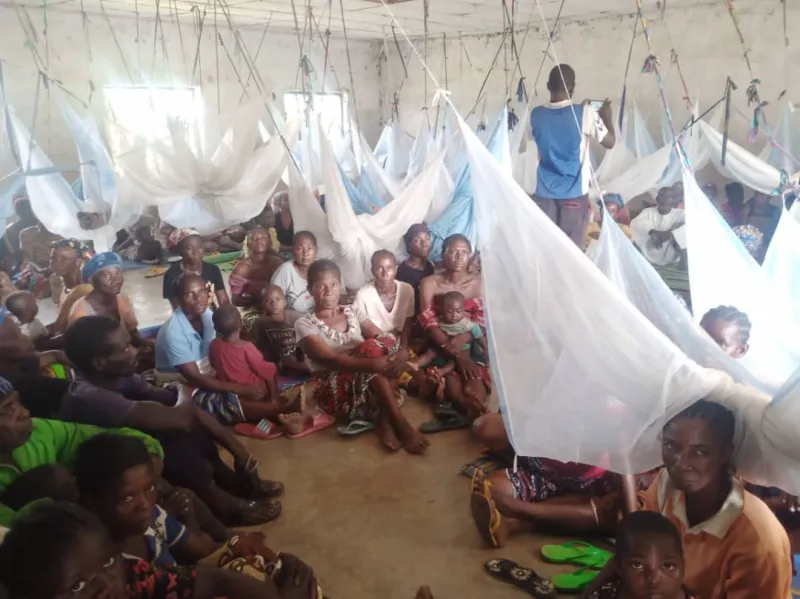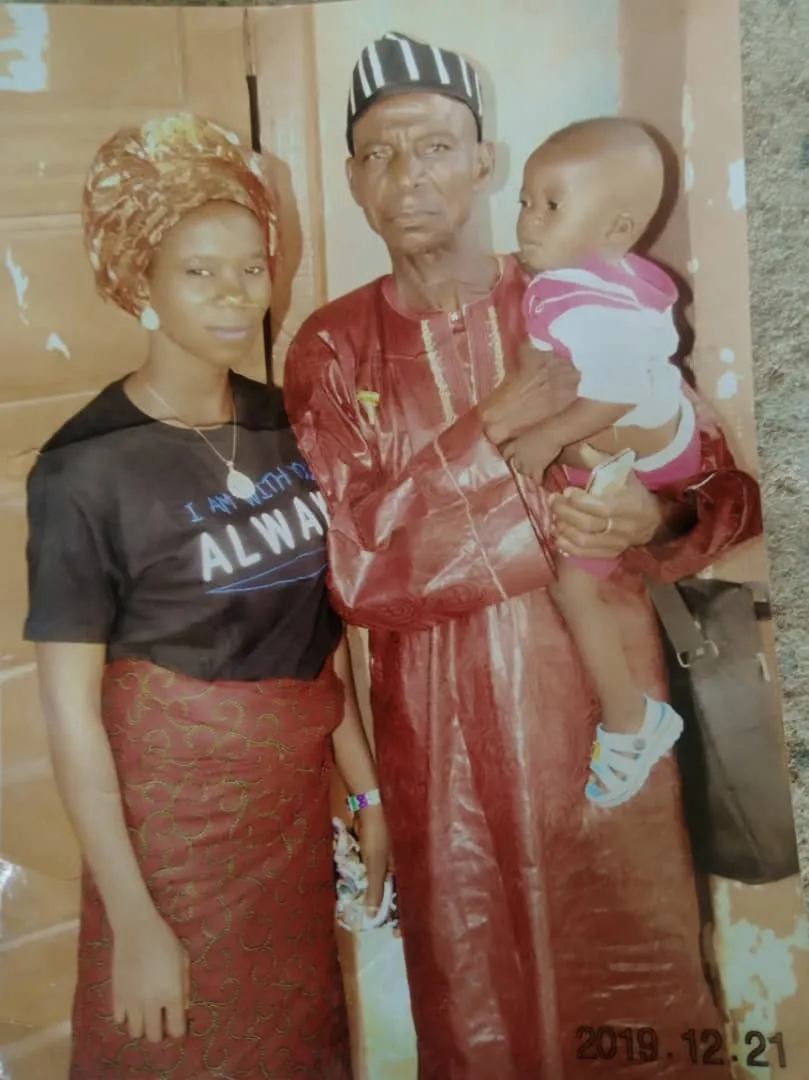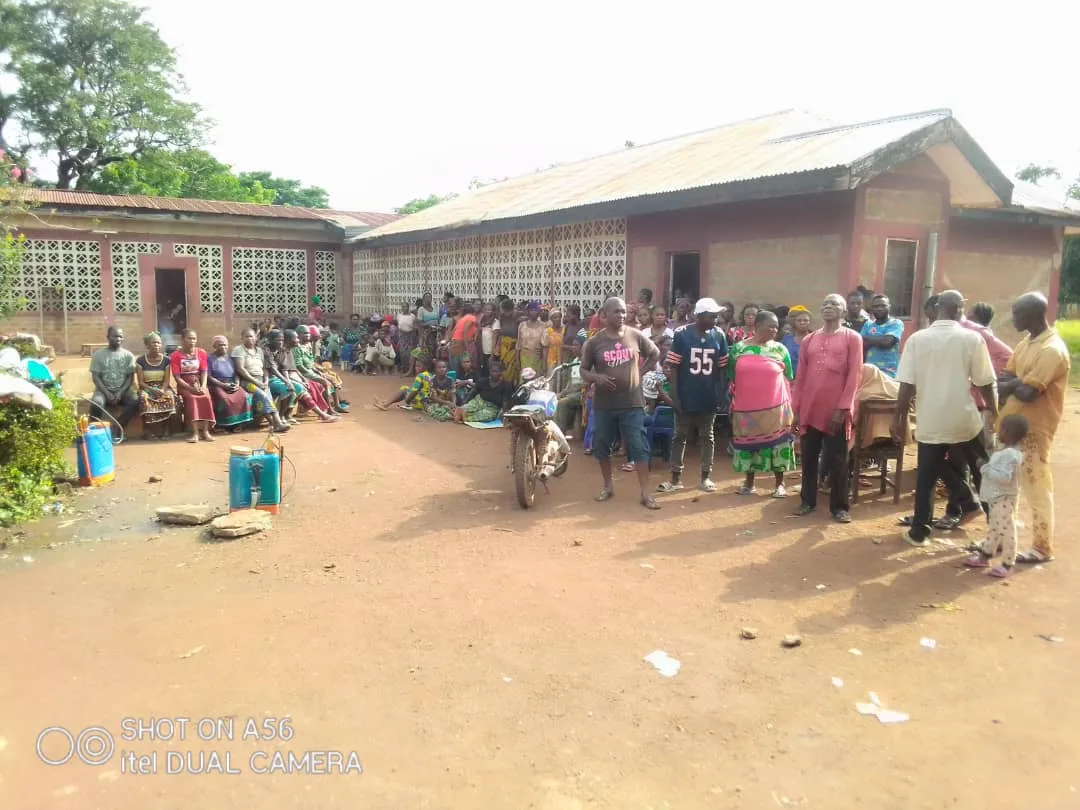
Jos, Nigeria, Aug 12, 2022 / 13:00 pm (CNA).
The news that help was on the way didn’t come soon enough for Joy Akaa.
The 30-year-old mother of three lost her husband, Orguze Akaa, 50, when he was shot and killed in an ambush June 30 while scrounging for extra food for their family in embattled Benue State, located in north-central Nigeria.
Yet for Akaa and others attending Mass Aug. 7 at St. Francis Xavier Parish in Agagbe, it still came as a relief to learn that Benue’s governor, Samuel Ortom, had decided to arm a 500-man volunteer militia to help defend communities like Agagbe from radicalized Islamic bandits.
“We are ready! We are ready to defend our people and our land,” Ortom vowed, as Channels Television reported.
“We cannot continue to play around and let them [terrorists] continue,” the governor said. “Benue is under siege.”
Akaa only wished Benue’s leaders had taken this step sooner.
“If there were security guards in the village, my husband would have still been alive,” she told CNA. “But the lack of security was what cost his life.”
Desperate for food
Akaa and her children are among the thousands of people uprooted by bandit attacks in surrounding villages and towns in recent years who have sought refuge at camps set up near St. Francis Xavier Parish, which oversees a network of dozens of smaller churches within the Diocese of Makurdi.

Residents blame radicalized herdsmen from the Fulani tribe, a large ethnic group in West Africa, for the violence.
More than 1,700 people in Benue State have been killed in these attacks since 2018, a spokesman for the Idoma and Igede ethnic groups said in November.
According to the International Society for Civil Liberties and Rule of Law, militants “propagating an Islamic agenda” have killed 192 persons thus far in 2022 in Benue, making it the fourth most terrorized state behind Kaduna, Niger, and Plateau States.
More than 1 million people have been displaced by the violence, according to some estimates. The vast majority of these people — about 80% — are being cared for by the Makurdi diocese, Bishop Wilfred Chikpa Anagbe has said.
But places of refuge like St. Francis Xavier Parish are feeling the strain. Benue is known as the most productive agricultural state in Nigeria, often called the nation’s breadbasket. Yet many of the people in the camps go hungry.
“The federal government rarely sends anything to us,” said Ibaa Terna Jacob, who oversees the humanitarian effort at St. Francis Xavier. “The last time they sent us food was months ago.”
On June 30, Orguze Akaa felt his only option was to walk three hours and dig for mud-burrowing fish in a dried-up stream bed close to his abandoned town of Tse-anyion. It was a risky journey, but the once-successful farmer would not give up.
It cost him his life.
Seventeen others have met the same fate, said Adakole Daniel, a local youth leader.
“All the attacks occurred while the people were searching for their daily meals,” Daniel said in a phone interview.
Persistent attacks
Bishop Anagbe says the bandits are working in a coordinated fashion to clear out the densely populated state to make room for herding communities.
“The scale of killings, displacement and wanton destruction of property by these Fulani jihadists militia only buttresses the now revealed agenda to depopulate Christian communities in Nigeria and take over lands, “ Anagbe wrote in a report issued July 3.
“Tellingly, the government in power in Nigeria at the moment continues to do nothing about these persistent attacks, save to give laughable reasons like climate change or that some Muslims, too, are sometimes killed in attacks by so-called bandits.“
“Having said the above, I would like to again say that, notwithstanding the threats to personal harm especially when people speak up against the evil Fulani herdsmen jihadists, we shall continue to draw the attention of the outside world to the plan by Islamists and their sponsors to Islamize Christian territories through these killings and occupation of lands,” Anagbe continued.
“Recall what I said in my previous report that from the time I became bishop of Makurdi in 2014 to the present day, hardly a day passes by that I don’t receive a sad story of killing and displacement of our people by barbaric Fulani herdsmen,” he wrote. “For some years now I have not been able to carry out pastoral activities in parts of my diocese.“

From May 1 to June 30, 70 unarmed persons across Benue State were murdered by Fulani terrorists, the bishop said.
The latest attack on July 14 killed three villagers working on a farm near Akakuma village in the Guma Local Government Area, or county, said Nyiakaa Mike, the county chairman.
“They were seven working in their farms when the herdsmen shot three dead and kidnapped four others,” Mike said in a phone interview.
His colleague who heads Gwer West Local Government Area, Ayande Andrew, said attacks by terrorists in his county occur daily. “They [terrorists] have sent people out of their villages and each time they [villagers] try to access their farms to feed, they are killed,” Andrew said in a phone interview.
“They move freely with their guns and have taken over more than 30 communities,” he said.
Sacraments disrupted
Father Cletus Bua, the priest in charge of St. Francis Xavier Parish, said attacks by Fulani militias since 2018 have blocked close to 20,000 congregants from attending Mass and receiving other sacraments in his parish.
“In Agbage [parish], we have 50 outstations and all of them have been displaced by the Fulani militias,” Bua said.
“These are churches with members ranging from 200 to 400 each. Many more are folding up in other parishes as the attacks are increasing,” he said.
“Even the parish headquarters in Agagbe itself is not safe because they have attacked the community in 2019,” he added.
The parish is one of 15 in the Makurdi diocese, which is home to some 1 million Catholics. The diocese has been the hardest hit of the four dioceses in Benue State.
“This is where the Fulani started their genocide in Benue,” Mike, the county leader, said.
Will armed volunteers make a difference?
Joy Akaa expressed some optimism to CNA. “If these [militia volunteers] will truly work, then maybe what happened to my husband will not happen again,” she said.
If you value the news and views Catholic World Report provides, please consider donating to support our efforts. Your contribution will help us continue to make CWR available to all readers worldwide for free, without a subscription. Thank you for your generosity!
Click here for more information on donating to CWR. Click here to sign up for our newsletter.




Leave a Reply